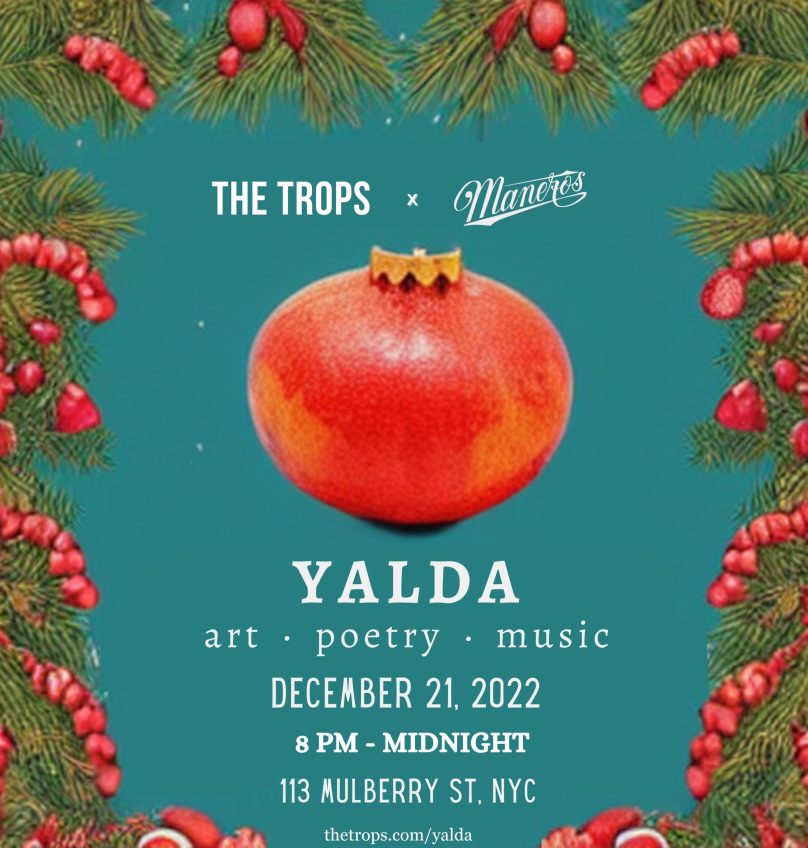SHAB - E-YALDA
WINTER SOLSTICE
Wednesday December 21, 2022
8pm - midnight

Manero's on Mulberry, 113 Mulberry St, NYC
The Trops organizes cultural experiences for the arts communities of NYC and beyond. This Winter Solstice Holiday Event is about honoring Iranian Art & Culture during a traditional Persian holiday, Yalda.
Originating in the pre-Zoroastrian tradition, Yalda, also referred to as Chelleh, celebrates the sunrise after the longest night of the year. Ancient Persians believed that evil forces were strongest on the longest and darkest night of the year.
Every year, Iranian people celebrate Yalda night on the longest night of the year by gathering together for eating, drinking and reading poetry through the night.
In line with this tradition, The Trops is hosting a Yalda evening of visual arts, performance arts, and poetry in the Heart of New York City.
This is a social event, and will feature live music, poetry, Iranian cinema clips. Guests are invited to bring backgammon, persian poetry to read, and musical instruments.
Iranian Poetry
A tradition of folklore and poetry in Persian Culture has been passed on for generations.
Some notable poets:
Rumi
Jalāl ad-Dīn Mohammad Rūmī, or more commonly known as Rumi, is considered the greatest Sufi mystic and poet in Persian language by many. He was born in 1207 in Balkh, part of the Khwarezmian Empire (present-day Afghanistan).
“I learned that every mortal will taste death. But only some will taste life.”
“Don’t grieve. Anything you lose comes round in another form.”
“Raise your words, not voice. It is rain that grows flowers, not thunder.”
Hafez
Khāwje Shams-od-Dīn Moḥammad Ḥāfeẓ-e Shīrāzī (1315-1390) was a Persian poet known by his pen name Hafez (also spelled Hafiz). He’s one of the greatest poets of Persia, his works are regarded by many as a pinnacle of Persian literature.
“The words you speak become the house you live in.”
“Be content with what thou hast received, and smooth thy frowning forehead.”
“Fear is the cheapest room in the house. I would like to see you living in better conditions.”
Saadi
Saadi Shīrāzī (1210-1291) was a major Persian poet of the medieval period. He is better known by his pen name Saadi or Saʿdī. He grew up in a family of religious scholars in Shiraz, Iran.
“A little beauty is preferable to much wealth.”
“O wise man, wash your hands of that friend who associates with your enemies.”
“A man is insensible to the relish of prosperity till he has tasted adversity.”
Omar Khayyam
Omar Khayyam (1048 – 1131) was not only famous for his poetry. The Persian poet was also a mathematician, astronomer, historian, philosopher, and polymath. Interestingly, Omar was known in his own country and time primarily for his achievements in science, not poetry.
“The thoughtful soul to solitude retires.”
“Living Life Tomorrow’s fate, though thou be wise, Thou canst not tell nor yet surmise; Pass, therefore, not today in vain, For it will never come again.”
“I often wonder what the vintners buy one half so precious as the stuff they sell.”
Ferdowsi
Ferdowsi, pseudonym of Abū al-Qasem Manṣūr (940-1019/1025) is one of the greatest figures in the history of Persian literature. The Persian poet is the author of Shāh-nāmeh (“Book of Kings”), one of the world’s longest epic poems created by a single poet.
“And the blood of brave men was shed like unto the shedding of rain from a black cloud.”
“And now may the blessing of God rest upon all men. I have told unto them the Epic of Kings, and the Epic of Kings is come to a close, and the tale of their deeds is ended.”
“How shall a man escape from that which is written; How shall he flee from his destiny?”
Iranian Cinema
Iranian cinema pre-Revolution (1979) looked very different from the industry today. Follow the link below to read about the history and timeline of Iranian cinema:
The below video is a collage of many classic Iranian films with music by Ali Azimi, titled Pishdaramad, which means "prelude."

